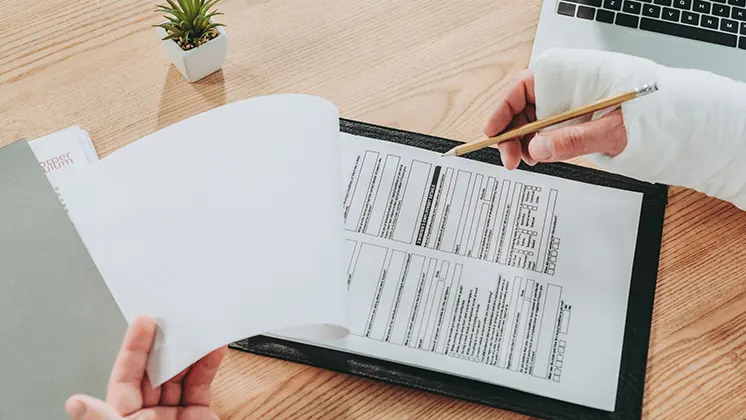9 Workers’ Comp Adjuster Tricks to Watch Out For

Most Virginia employees know that they may get workers’ compensation if they get injured on the job. However, many workers’ comp claimants are baffled at how challenging it can be to receive the compensation they deserve. Employers typically purchase an insurance policy to cover worker’s comp claims, and ideally, the insurance company should handle claims fairly and straightforwardly. This is often not the case.
Workers’ comp claimants have to deal with insurance adjusters who are experienced in undermining claims and minimizing what the insurer has to pay. If you’re an employee who’s trying to claim workers’ compensation, look out for these tactics that the insurance adjuster may use when dealing with you.
Getting a Recorded Statement from You
Soon after your accident, the insurance adjuster will contact you on the phone or in person, and ask you questions about your injury. They will try to get your permission to record the conversation. It’s not advisable to agree to recorded conversations, as any statement you make could be used to damage your claim.
Sometimes, adjusters try to make it seem like you need to give a recorded statement in order to receive your benefits. You are under no obligation to do so. Virginia law doesn’t require you to give a recorded statement to the insurer.
Before speaking with an insurance representative, it’s best that you get the guidance of a workers’ compensation attorney.
Getting You to Sign a Medical Records Release
Workers’ comp insurance adjusters are allowed to get copies of your medical records pertaining to your job-related injury, but they’re not entitled to records beyond that. Your adjuster might ask you to sign a comprehensive medical release form, which is a blanket form authorizing them to access your entire medical history.
If you sign this, they’ll be able to comb through your past injuries, pre-existing conditions, and other health conditions which they could use to downplay your work injury. They could say, for example, that your current injury isn’t due to your work but has to do with a previous injury you had.
Bear in mind that you are not required to sign this medical authorization form. If you’re unsure about the documents they ask you to sign, consult your attorney.
Spying on You in Person and Online
Insurance adjusters will look for any reason to downplay your injury claim, and that includes watching your activities. It’s common for insurance companies to hire private investigators who will photograph or film you. This is generally legal as long as you are in public view – even if you’re just walking up your driveway or taking out the trash.
If you’re doing anything more physical, such as jogging or tending to your garden, the adjuster could say your injury is not as serious as you claim.
Similarly, they’ll monitor your social media activities that are viewable by the public. It’s best to avoid posting about any improvements in your condition or about activities you’ve been doing. Also ask your friends and family to avoid including you in their posts, even if it’s just a harmless family gathering or party.
Not Offering a Panel of Doctors
Under Virginia’s worker compensation rules, your employer or their insurer must present you with a panel of three doctors to choose from while you’re claiming worker’s comp. The doctor you choose will be your authorized treating physician, in charge of your medical care and providing medical opinion in your case.
Sometimes, however, an insurance adjuster will give a claimant just one authorized doctor instead of letting them choose from a panel. If the claimant is unaware that they could have options, they’ll end up going with the doctor who is likely on the side of the insurance company.
Delaying the Insurer’s Decision for Various Reasons
After you file your claim with the workers’ comp insurer, they must respond within a reasonable amount of time, telling you whether they accept or deny your injury. Unfortunately, in Virginia, insurance companies can get away with delaying their response for as long as possible, in hopes that you’ll eventually give up your claim. Insurance adjusters give various reasons for their delays:
- They ask for more and more documentation from you.
- They say their investigation is still incomplete.
- They outright refuse to answer your phone calls or letters.
Often, insurance adjusters will drag the process until you get a lawyer and file a claim with the Virginia Workers’ Compensation Commission (VWCC). Once your case is in the Commission’s docket, it will be subject to a timeline that the insurance company has to comply with.
Giving You an Inaccurate Award Agreement Form
If the work comp insurance company accepts your injury claim, the insurance adjuster will send you an “Agreement to Pay Benefits” form, commonly known as an award agreement. They’ll need you to sign this form so they can get the approval of the Virginia Workers Compensation Commission.
The award agreement should state your injured body parts covered, your compensation rate (two-thirds of your average weekly wage), and the date the compensation should begin. A surprising number of claimants receive forms with inaccurate details, such as incomplete list of injured body parts or a lower weekly wage. Some of these claimants end up signing anyway, unaware of what they’re really entitled to, or just hoping to get their compensation quickly.
Bear in mind that once you sign the award form, you could be giving up any claims of other body parts or coverages not stated in the form.
Delaying the Payment for Various Reasons
Very often, even after a worker already has an award order from the VWCC, the insurance company will delay sending payments for as long as they can. What many workers don’t realize is that they can request the Commission to penalize the insurer, and the penalty is 20 percent of the amount owed. If your worker’s compensation check is late by more than 14 days, get a lawyer’s help to request the penalty.
Paying You Some Benefits Until the Statute of Limitations Runs Out
On the other hand, some insurers choose to immediately pay you some benefits to give you a false sense of security and dissuade you from formally filing with the VWCC.
Under Virginia’s statute of limitations, you have two years from the date of your injury to file your VWCC claim. If you’ve been delaying your filing and the time limit runs out, you’ll likely lose your right to claim for the same injury. At this point, the insurer could stop sending you payments and you would no longer have an avenue to claim the benefits you deserve.
Convincing You That Your Case is Closed
In some cases, the insurance adjuster will tell the claimant that the case is closed after they’ve denied the injury or after the claimant has refused to accept a low-ball offer. Numerous workers will give up their claim when they hear this. The truth is that a worker’s compensation case is never truly closed until any of the following occurs:
- The claimant has agreed to a settlement and the Commission has approved it
- The claimant lost their claim at the Commission’s hearing and has lost all possible appeals
- The claimant delayed their VWCC filing past the statute of limitations.
Unless any of the above has happened in your case, you may still be able to pursue the worker’s comp you deserve. Reach out to a lawyer for advice and representation.
Talk to a Trusted Virginia Workers’ Comp Lawyer
Insurance companies have many opportunities and tactics to minimize your claim. However, you don’t have to face them by yourself. Protect your rights by talking to Attorney Jaleh K. Slominski, a highly trusted worker’s compensation attorney in the Lynchburg area. Ms. Slominski’s legal service has resulted in favorable outcomes for Virginia workers, and she is not afraid to face powerful companies and insurers.
Talk to Attorney Slominski about your worker’s comp concerns. Contact by calling (434) 384-9400 (in Lynchburg) or (540) 554-3762 (in Roanoke).





